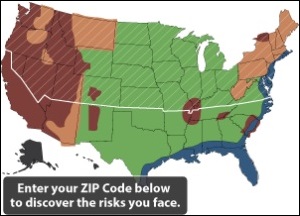by Brianna Crandall — December 5, 2014—The Insurance Institute for Business and Home Safety (IBHS) recently announced that it strongly endorses several recommendations made by the President’s Task Force on Climate Preparedness and Resilience.
“IBHS is enthusiastic about a number of proposals put forward by the Task Force today. The Institute is a major proponent of the underlying premise of creating more resilient communities, and we are working with government at all levels, NGOs, and the private sector to make that a reality,” said Julie Rochman, IBHS president and CEO.
“It is critical that both residents and businesses are included in this process. If employees and their families are displaced due to a disaster, their focus — understandably — will be getting their lives back together. Similarly, when businesses are closed due to disasters, jobs and local revenue disappear, causing great harm to the entire community,” Rochman noted.
“We have been engaged in working on a number of the Task Force’s recommendations for some time. For example, IBHS has long advocated ‘…maximizing opportunities to take actions that have dual benefits of increasing community resilience and reducing greenhouse gas emissions.’ At IBHS, we call this Going Green and Building Strong. We have identified and promote ‘two-fers’ whenever possible, such as using impact-resistant glass, which helps make buildings more resistant to hail and wildfire and is great for energy efficiency,” said Rochman.
IBHS’s “Going Green and Building Strong” ideal is exemplified in its FORTIFIED construction and renovation programs.
Another theme IBHS has consistently stressed both when meeting government leaders and in testifying before Congress in relation to public policy is the importance of strengthening ‘…coordination and partnerships among federal agencies, and across federal, state, local, tribal, and territorial jurisdictions, as well as economic sectors.’
“It is essential that both public and private sectors employ ‘smart spending’ of response and recovery resources to break the cycle of destruction that many communities are trapped in because they put the same buildings back in vulnerable areas without doing anything to make those buildings and surrounding infrastructure more resilient,” Rochman explained.
A fundamental underpinning of the building science research conducted by IBHS is to support risk mitigation and disaster preparedness and recovery, recommended by the Task Force. This also is integral to IBHS consumer resources, including the Institute’s hazard-identification ZIP code tool (available on the IBHS Web site home page), which allows the public to enter their ZIP code to see what hazards they face, and learn how to protect against them.
“Knowing and understanding risk is a critical function of local officials. Accurately and fully communicating about risks and vulnerabilities also is important — as are identifying and incentivizing effective mitigation actions,” Rochman said.
One of the key Task Force recommendations is to “remove barriers to rebuilding for future climate resilience.” IBHS has long been aware of inconsistencies in FEMA grant-making authorities that fail to optimize cost-effective resilient rebuilding.
IBHS says it has been committed to “promot[ing] private sector workforce resilience to reduce economic disruptions associated with the impacts of climate change” for some time. OFB-EZ, (Open for Business-EZ), IBHS’ free business continuity program, provides small businesses with the tools to understand their greatest vulnerabilities and prepare vital continuity plans. Also, laboratory testing at IBHS’ Research Center is attempting to define the commercial application of Going Green and Building Strong, for example, by looking at the wind vulnerability of photovoltaic panels on commercial roofs.

“We also have been working closely with the White House on its strategy to appropriately engage the insurance industry in encouraging more robust resilience standards, especially stronger building codes. The Task Force recommended a few items related to insurers, such as ‘[Adjusting] pricing structures to incentivize building that anticipates climate trends.’ Equally important is disincentivizing dangerous, brittle and vulnerable construction,” Rochman stated.
Finally, the Task Force recommended that insurers “create incentives through favorable ratings for insurance and bonds for communities that adopt robust resilience standards and practices, including stronger building codes.”
“IBHS is supportive of this idea in principle, but it is crucial that building codes are aggressively enforced in order to be effective. In the absence of strong enforcement practices, strong codes are just another piece of paper,” Rochman said.
“IBHS will continue helping to build resilient communities that can stand up to extreme weather events. We look forward to working with the President’s Task Force, and many other public and private sector entities, to achieve this goal as quickly possible. It’s not a matter of if there will be another devastating disaster, just when it will happen,” concluded Rochman.




